-
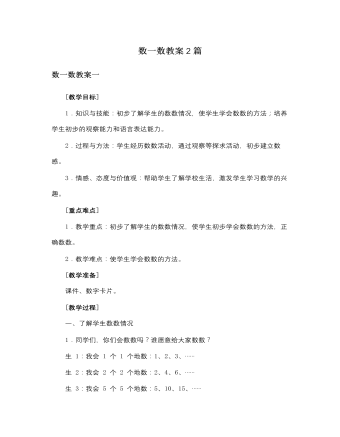
人教版新课标小学数学一年级上册数一数教案2篇
[在学生数的过程中再加强点数的指导,同时有意识的培养学生按顺序数数。另外,在数六朵花、八棵树、九名女生、十名男生的时候,除了 1 个 1 个地数以外,还可以引导学生 2 个 2 个地、3 个 3 个地、4 个 4 个地、5 个 5 个地数数,为后面学习 10 以内各数打基础。] (2)小组进行交流。 再从 1~10 数一数物体的个数。 (3)认一认。 师:你认识这些数吗?边指边读给大家听听。 生:边指 1~10 各数边读一读。 三、巩固练习 1.结合实物,开展数数活动。 (1)按要求数出下面物体的个数。 师:同学们刚才数得真不错!你们愿不愿意数一数自己文具盒中有几支铅笔呀? 生:数出自己文具盒中有几支铅笔并汇报。 师:请同学们数一数你的书包里共有几本书? 生:数出自己书包里共有几本书并汇报…… (2)自由数物体的个数。 师:你还想数哪些物体的个数?和同桌的小伙伴交流一下。
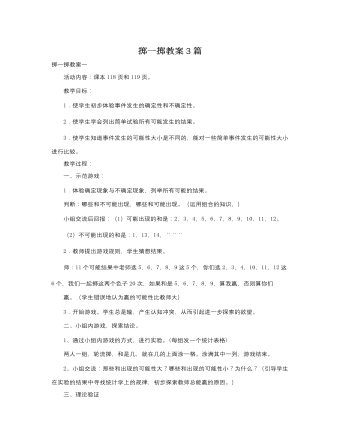
人教版新课标小学数学三年级上册掷一掷教案3篇
3、开始游戏。学生总是输,产生认知冲突,从而引起进一步探索的欲望。(二)小组内游戏,探索结论。通过小组内游戏的方式,进行实验,利用统计的方式呈现实验的结果,初步探索教师总能赢的原因。要引导学生在实验的结果中寻找统计学上的规律。(三)理论验证通过组合的理论来验证实验的结果。可以用不同的方式来进行组合,让学生探讨每个“和”所包含的组合情况的多少与这个“和”出现的次数之间的关系。三、师生共同小结本次活动1、通过本次活动,你有什么新的收获?2、师生总结:本次活动通过猜想、实验、验证等过程,让同学们在问题情境中自主探索,解决问题,既发展了同学们的动手实践能力,又充分调动了同学们的学习兴趣。
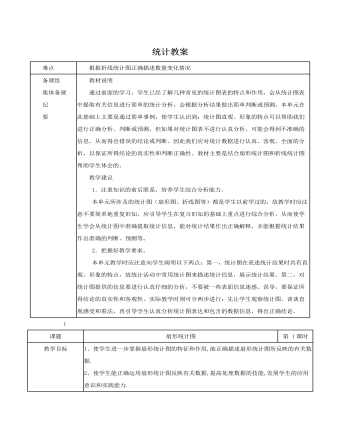
人教版新课标小学数学六年级下册统计教案
分别算出2008年比2007年各季度增产的百分数和合计数,再制成统计表.分析:根据题目要求,要算出各季度增产的百分数,我们只要根据2008年与2007年各个季度的原始数据,运用“求一个数是另一个数的百分之几”的方法就可以算出.算出了各个季度增产的百分数,根据题意制统计表时,既要按照季度分类,又要反映出年份的类别,所以在确定表头时可分为3部分:年份、台数、季度,年份又分为2007年产量、2008年产量、2008年比2007年增产的百分数.2、田力化肥厂今年第一季度生产情况如下:元月份计划生产1500吨,实际生产1620吨;二月计划生产1600吨,实际生产1680吨;三月份计划生产1640吨,实际生产1720吨,根据上面的数据,算出各月完成计划的百分数,并制成统计表.(1)制作含有百分数的统计表时,百分数这一栏一定要写清楚是谁占谁的百分之几,并按“求一个数是另一个数的百分之几”的解题方法正确算出对应百分数”
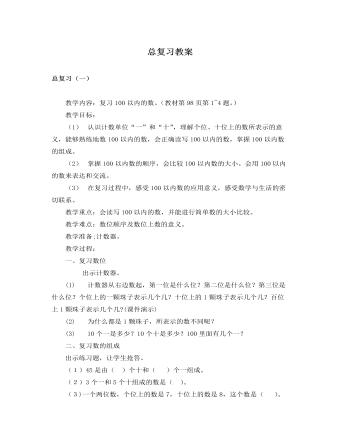
人教版新课标小学数学一年级下册总复习教案
教学内容:复习100以内的数。(教材第98页第1~4题。)教学目标:(1) 认识计数单位“一”和“十”,理解个位、十位上的数所表示的意义,能够熟练地数100以内的数,会正确读写100以内的数,掌握100以内数的组成。(2) 掌握100以内数的顺序,会比较100以内数的大小。会用100以内的数来表达和交流。(3) 在复习过程中,感受100以内数的应用意义,感受数学与生活的密切联系。教学重点:会读写100以内的数,并能进行简单数的大小比较。教学难点:数位顺序及数位上数的意义。教学准备;计数器。教学过程:一、复习数位出示计数器。(1) 计数器从右边数起,第一位是什么位?第二位是什么位?第三位是什么位?个位上的一颗珠子表示几个几?十位上的1颗珠子表示几个几?百位上1颗珠子表示几个几?(课件演示)(2) 为什么都是1颗珠子,所表示的数不同呢?(3) 10个一是多少?10个十是多少?100里面有几个一?
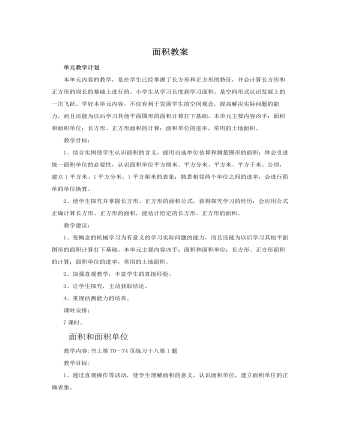
人教版新课标小学数学三年级下册面积教案
教学内容:书上第84页公顷、平方千米教学目标:1、让学生知道公顷、平方千米是更大的面积单位,了解1公顷、1平方千米的实际大小。2、知道1公顷=10000平方米,1平方千米=100公顷。3、培养学生的空间观察和动手操作能力,培养学生的爱国主义情感。教学重点:使学生了解1公顷、1平方千米的大小。掌握土地面积单位间的进率。教学难点:建立1公顷及1平方千米的实际概念,能区分两个单位。教学准备:课件教学过程:一、巩固旧知,作好铺垫。1、常用的面积单位有哪些?2、用打手势表示一下1平方厘米、1平方分米、1平方米的大小。3、填写正确的面积单位:指甲的面数学书本的封面黑板的面二、引入:同学们,我们一起来看看体育场的图片,你们有什么感想?出示:(体育场太大了)那还能用我们前面学过的面积单位进行测量吗?这就是我们今天要学的比平方米更大的面积单位:公顷和平方千米。(出示课题:公顷、平方千米)三、新授1、通常我们在测量土地面积时,要用到更大的面积单位,公顷和平方千米。它们到底有多大呢?这节课我们就来了解一下。
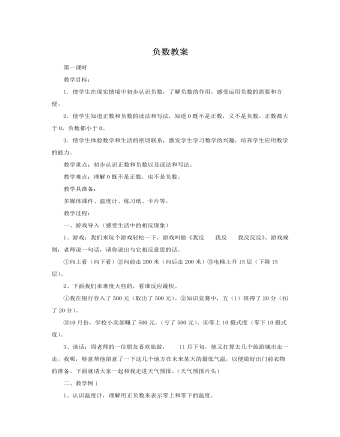
人教版新课标小学数学六年级下册负数教案
(3)教师在黑板上话好直线,在相应的点上用小图片代表大树和学生,在问怎样用数表示这些学生和大树的相对位置关系?(让学生把直线上的点和正负数对应起来。(4)学生回答,教师在相应点的下方标出对应的数,再让学生说说直线上其他几个点代表的数,让学生对数轴上的点表示的正负数形成相对完整的认识。(5)总结:我们可以像这样在直线上表示出正数、0和负数,像这样的直线我们叫数轴。(6)引导学生观察:A、从0起往右依次是?从0起往左依次是?你发现什么规律?B、在数轴上分别找到1.5和-1.5对应的点。如果从起点分别到.5和-1.5处,应如何运动?(7)练习:做一做的第1、2题。(二)教学例4:1、出示未来一周的天气情况,让学生把未来一周每天的最低气温在数轴上表示出来,并比较他们的大小。
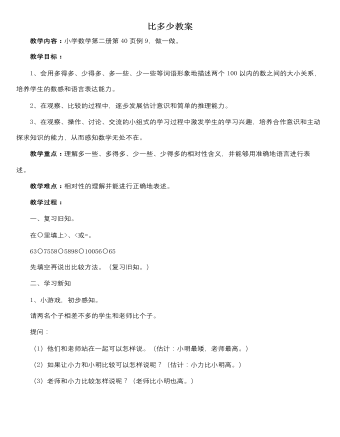
人教版新课标小学数学一年级下册比多少教案
教学目标:1、会用多得多、少得多、多一些、少一些等词语形象地描述两个100以内的数之间的大小关系,培养学生的数感和语言表达能力。2、在观察、比较的过程中,逐步发展估计意识和简单的推理能力。3、在观察、操作、讨论、交流的小组式的学习过程中激发学生的学习兴趣,培养合作意识和主动探求知识的能力,从而感知数学无处不在。教学重点:理解多一些、多得多、少一些、少得多的相对性含义,并能够用准确地语言进行表述。教学难点:相对性的理解并能进行正确地表述。教学过程:一、复习旧知。在O里填上>、<或=。63O7558O5898O10056O65先填空再说出比较方法。(复习旧知。)
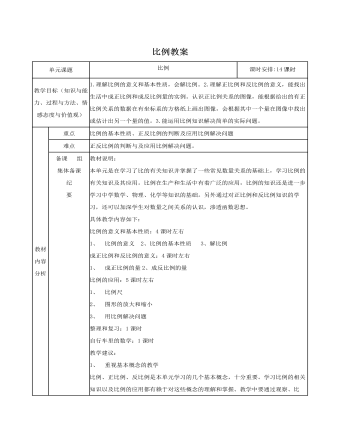
人教版新课标小学数学六年级下册比例教案
一、回顾旧知,复习铺垫1、上节课我们学习了一些比例的知识,谁能说一说什么叫做比例?比例的基本性质是什么?应用比例的基本性质可以做什么?2、判断下面每组中的两个比是否能组成比例?为什么?6:3和8:4 : 和 :3、这节课我们继续学习有关比例的知识,学习解比例。(板书课题)二、引导探索,学习新知1、什么叫解比例?我们知道比例共有四项,如果知道其中的任何三项,就可以求出这个比例中的另外一个未知项。求比例中的未知项,叫做解比例。解比例要根据比例的基本性质来解。2、教学例2。(1)把未知项设为X。解:设这座模型的高是X米。(2)根据比例的意义列出比例:X:320=1:10(3)让学生指出这个比例的外项、内项,并说明知道哪三项,求哪一项。根据比例的基本性质可以把它变成什么形式?3x=8×15。这变成了什么?(方程。)教师说明:这样解比例就变成解方程了,利用以前学过的解方程的方法就可以求出未知数X的值。
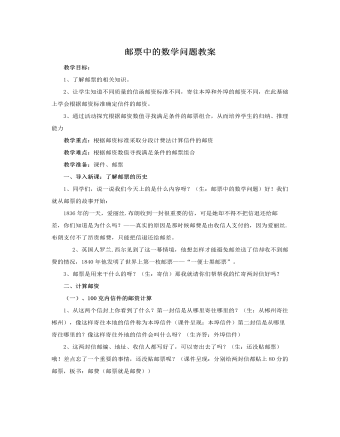
人教版新课标小学数学六年级下册邮票中的数学问题教案
《贴邮票》活动要求:A、每组4人,给四封不同地点、质量的信件B、根据信封上的信息计算邮费并按要求贴上邮票(邮票的总面值刚好等于邮费,不能多贴)每封信最多贴三张邮票,只有0.8元或1.2元的两种邮票纪律要求:看看哪组合作得最好,速度最快!如果遇到困难,在事发那个在一边最后再去解决。3、小组汇报(1)、贴邮票的过程中大家遇到了什么问题?(有的能贴有的不能贴)这样的信件有哪些?(告诉我地点、质量、邮费)(2)、其他的信件都能贴出来嘛?说说看你是怎么贴邮票的?(3)、请将你们贴好邮票的信件送到邮箱来。剩下的都是一些“难题”(4)、思考:为什么4.0元、4.8元、6元的邮费没有办法按要求贴出邮票?(5)、原因出在哪里?这个问题怎么解决?(邮票面值太小,将邮票的面值改大)(6)、那最少要改成多大的?为什么?(将邮票面值改大,你会从多大面值的邮票开始考虑?为什么?)
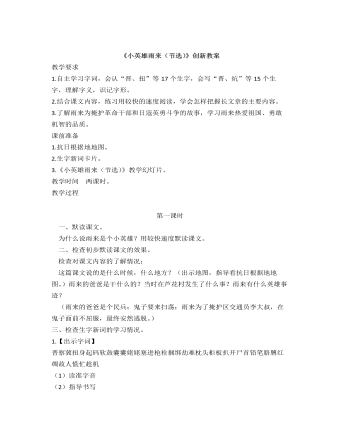
部编人教版四年级下册《小英雄雨来》创新教案
(二)提问:夜校的学习条件怎样?雨来在夜校里受到什么教育?默读第二段。指导朗读:“我们是中国人,我们爱自己的祖国。”“我们——是——中国人,我们——爱——自己的——祖国。”讨论段意和小标题。(段意:雨来上夜校,受到爱国主义教育。)(小标题:“雨来上夜校。”)(三)学习第三段。默读课文,提问:这段主要说了几层意思?学生默读课文,小组交流,展示如下:(两层意思:第一层从“有一天”至“只从街上传来一两声狗叫”,主要写鬼子开始扫荡了;第二层从“第二天”至这段结束,主要写雨来为掩护交通员李大叔,被鬼子捆绑起来了。)指导朗读第二层。重点朗读:“他抬头一看,是李大叔。”“咦!这是什么时候挖的洞呢?”“把缸搬回原地方。你就快到别的院里去,对谁也不许说。”讨论段意和小标题。段意:(雨来为掩护交通员李大叔,被鬼子捆绑起来了。)(小标题:“雨来掩护李大叔”。)
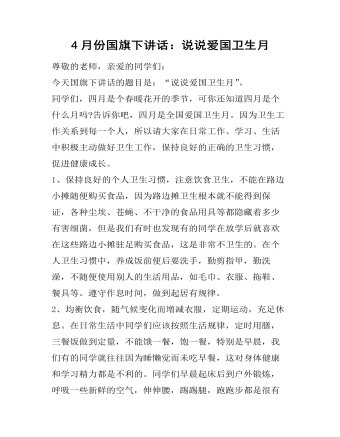
4月份国旗下讲话:说说爱国卫生月
尊敬的老师,亲爱的同学们:今天国旗下讲话的题目是:“说说爱国卫生月”。同学们,四月是个春暖花开的季节,可你还知道四月是个什么月吗?告诉你吧,四月是全国爱国卫生月。因为卫生工作关系到每一个人,所以请大家在日常工作、学习、生活中积极主动做好卫生工作,保持良好的正确的卫生习惯,促进健康成长。1、保持良好的个人卫生习惯,注意饮食卫生,不能在路边小摊随便购买食品,因为路边摊卫生根本就不能得到保证,各种尘埃、苍蝇、不干净的食品用具等都隐藏着多少有害细菌,但是我们有时也发现有的同学在放学后就喜欢在这些路边小摊驻足购买食品,这是非常不卫生的。在个人卫生习惯中,养成饭前便后要洗手,勤剪指甲,勤洗澡,不随便使用别人的生活用品,如毛巾、衣服、拖鞋、餐具等。遵守作息时间,做到起居有规律。2、均衡饮食,随气候变化而增减衣服,定期运动,充足休息。在日常生活中同学们应该按照生活规律,定时用膳,三餐饭做到定量,不能饿一餐,饱一餐,特别是早晨,我们有的同学就往往因为睡懒觉而未吃早餐,这对身体健康和学习精力都是不利的。同学们早晨起床后到户外锻炼,呼吸一些新鲜的空气,伸伸腰,踢踢腿,跑跑步都是很有好处的。

新人教版高中英语选修2Unit 1 Science and Scientists-Using langauge教学设计
This happens because the dish soap molecules have a strong negative charge, and the milk molecules have a strong positive charge. Like magnets, these molecules are attracted to each other, and so they appear to move around on the plate, taking the food coloring with them, making it look like the colors are quickly moving to escape from the soap.Listening text:? Judy: Oh, I'm so sorry that you were ill and couldn't come with us on our field trip. How are you feeling now? Better?? Bill: Much better, thanks. But how was it?? Judy: Wonderful! I especially liked an area of the museum called Light Games.it was really cool. They had a hall of mirrors where I could see myself reflected thousands of times!? Bill: A hall of mirrors can be a lot of fun. What else did they have?? Judy: Well, they had an experiment where we looked at a blue screen for a while, and then suddenly we could see tiny bright lights moving around on it. You'll never guess what those bright lights were!? Bill: Come on, tell me!? Judy: They were our own blood cells. For some reason, our eyes play tricks on us when we look at a blue screen, and we can see our own blood cells moving around like little lights! But there was another thing I liked better. I stood in front of a white light, and it cast different shadows of me in every color of the rainbow!? Bill: Oh, I wish I had been there. Tell me more!? Judy: Well, they had another area for sound. They had a giant piano keyboard that you could use your feet to play. But then, instead of playing the sounds of a piano, it played the voices of classical singers! Then they had a giant dish, and when you spoke into it, it reflected the sound back and made it louder. You could use it to speak in a whisper to someone 17 meters away.? Bill: It all sounds so cool. I wish I could have gone with you? Judy: I know, but we can go together this weekend. I'd love to go there again!? Bill: That sounds like a great idea!

新人教版高中英语选修2Unit 3 Food and Culture-Discovering useful structures教学设计
The newspaper reported more than 100 people had been killed in the thunderstorm.报纸报道说有一百多人在暴风雨中丧生。(2)before、when、by the time、until、after、once等引导的时间状语从句的谓语是一般过去时,以及by、before后面接过去的时间时,主句动作发生在从句的动作或过去的时间之前且表示被动时,要用过去完成时的被动语态。By the time my brother was 10, he had been sent to Italy.我弟弟10岁前就已经被送到意大利了。Tons of rice had been produced by the end of last month. 到上月底已生产了好几吨大米。(3) It was the first/second/last ... time that ...句中that引导的定语从句中,主语与谓语构成被动关系时,要用过去完成时的被动语态。It was the first time that I had seen the night fact to face in one and a half years. 这是我一年半以来第一次亲眼目睹夜晚的景色。(4)在虚拟语气中,条件句表示与过去事实相反,且主语与谓语构成被动关系时,要用过去完成时的被动语态。If I had been instructed by him earlier, I would have finished the task.如果我早一点得到他的指示,我早就完成这项任务了。If I had hurried, I wouldn't have missed the train.如果我快点的话,我就不会误了火车。If you had been at the party, you would have met him. 如果你去了晚会,你就会见到他的。

新人教版高中英语必修1Unit 1 Teenage Life-Listening and Speaking & Listening and Talking教案
Step 2 Listening and Talking1. The teacher is advised to talk with their new students about the related topic: Boys and girls, do you know some structures to talk about future activities? Talking about future activitiesWe’ll …I plan to …There’ll be …I hope to …We’re going to …2. After their small talk, the teacher can move on by playing the listening and solve the following task.Underline the expressions in the sentences below Cao Jing and Max use to talk about the future.We’ll learn useful skills.I plan to improve my spoken English.There’ll be students from different schools.I hope to make new friends.We’ll talk about teenage life.I’ll learn to make a fire.There’ll be students from different countries at the camp.There’ll be some experts there to show us how to live in the wild.We’re going to learn about wildlife.I’m going to give a speech.I think I’m going to enjoy the activities.I think we’ll have a lot of fun.3. Work in groups. Plan a youth camp.Teacher make the Ss think of ideas for the camp. And they can use the questions below to get started. And have the Ss present their ideas for a youth camp to the class.●What kind of camp is it?●Who will be there?●What will they do?●What will they learn?

新人教版高中英语必修1Unit 2 Travelling Around-Listening and Speaking & Listening and Talking教案
【教学目标与核心素养】1. Instruct students to get main facts by listening and motivate them to talk about the topics about how to prepare for the trip and make reservations by listening and ultimately can make travel arrangements and reservations. 2. Develop students’ sense of cooperative learning and individual thinking capability. 3. Develop students’ different listening skills to solve different listening comprehensive problems.4. Help students to understand how to use the structures “the present continuous tense (be doing) is used to express future plans.【教学重难点】1. Teach students how to focus on key words, not on single words or grammar.2. Prompt Ss to talk about the related topics, such as how to prepare for the trip and make a travel plan.【教学过程】Step 1: Listening and SpeakingLead inThe teacher is advised to talk with their students about the places that they want to travel most both at home and abroad: boys and girls, if you have a chance to travel around the world, where will you go? After their small talk, the teacher can move on by finishing the following listening task:Before travelling, what do we need to prepare for the trip?

新人教版高中英语必修1Unit 3 Sports and Fitness-Listening and Speaking & Listening and Talking教案
Finally, after finishing the task above, the teacher is expected to instruct students to work in groups to finish the following project:Speaking ProjectWhat event or activity would you like to invite your friend to? Make a conversation with a partner.Ski Race: Zhangjiakou, a beautiful city in northern China, will host the Youth Ski Race in December.Track Meet: a great event for track –and –field lovers on 26 October.Gym Class: come and work out at a gym! You can make it.Part 2: Listening and Talking:The teacher is advised to talk with their new students about the related topic: Boys and girls , what do you think of sportsmanship? Let’s listen and find out:Play the listening and match each opinion with the right speaker. Who do you agree with? Why?Cao Jing _____________ Lily _____________ Max _____________A. An athlete should do his/her best to win.B. The girl should stop and help the other girl. Good sportsmanship is more important than wining!C. An athlete should think about honor and his/her fans if he/she is competing for his/her country.Listen again and circle the expressions that you hear in the conversation.

新人教版高中英语必修1Unit 3 Sports and Fitness- Discovering Useful Structures—tag questions教案
【教材分析】This teaching period mainly deals with the grammar: tag questions.This period carries a considerable significance to the cultivation of students’ spoken English. The teacher is expected to enable students to master this period thoroughly and consolidate the knowledge by doing some exercise of good quality.【教学目标与核心素养】1. Get students to have a good understanding of the basic usages of tag questions.2. Enable students to use the basic phrases structures flexibly.3. Develop students’ speaking and cooperating abilities.4. Strengthen students’ great interest in grammar learning.【教学重难点】1. How to enable students to have a good understanding of the basic usages of tag questions.2. How to enable students to use the basic usages of tag questions flexibly.【教学过程】Step1: 语法自主探究一、基本组成方法1.肯定式陈述部分+否定附加疑问部分(前肯后否) You often play badminton, don’t you? 你经常打羽毛球,是吗?You are going to the gym with me, aren’t you?你要和我一起去健身房,是吗?She’s been to shanghai before, hasn’t she? 她以前去过上海,是吗?2.否定式陈述部分+肯定附加疑问部分(前否后肯) It isn't a beautiful flower, is it? 那不是美丽的花,是吗?You didn't go skating yesterday, did you? 你昨天没去滑冰,是吗?They can’t finish it by Friday, can they?他们不能在星期五之前完成,是吗?

新人教版高中英语必修3Unit 1 Festivals and celebrations-Discovering Useful Structure教学设计
4.That was an experience that frightened everyone. →That was _____________________. 答案:1. taking 2. being discussed 3. in the reading room 4. a frightening experienceStep 6 The meaning and function of V-ing as the predicative动词-ing形式作表语,它通常位于系动词后面,用以说明主语“是什么”或“怎么样”一种表示主语的特质、特征和状态, 其作用相当于形容词; 另一种具体说明主语的内容, 即主语等同于表语, 两者可互换。The music they are playing sounds so exciting. 他们演奏的音乐听起来令人激动。The result is disappointing. 结果令人失望。Our job is playing all kinds of music. 我们的工作就是演奏各种音乐。Seeing is believing. 眼见为实。Step 7 Practice1. It is ________(amaze) that the boy is able to solve the problem so quickly.2. Buying a car is simply _______(waste) money. 3. Please stop making the noise—it’s getting ________(annoy). 4. complete the passage with the appropriate -ing form.La Tomatina is a festival that takes place in the Spanish town Bunol every August. I think many food festivals are __________ because people are just eating. however, this festival is _________ because people don't actually eat the tomatoes. Instead, they throw them at each other! the number of people ________ part in this tomato fight, can reach up to 20,000, and it is a very __________ fight that lasts for a whole hour. The _______ thing is how clean Bunol is after the tomatoes are washed away after the fight. this is because the juice form tomatoes is really good for making surfaces clean!答案:1. amazing 2. wasting 3. annoying4. boring interesting taking exciting amazing

新人教版高中英语必修3Unit 1 Festivals and Celebrations-Reading and Thinking教学设计
The topic of this part is “Discover the reasons for festivals and celebrations.The Listening & Speaking & Talking part aims at talking about the experiences and feelings or emotions about the festivals and celebrations. This section aims at detecting the reason why the people celebrate the festivals, the time, the places, the types and the way of celebrations. It also explains why some traditions in the old celebrations are disappearing, like the firecrackers in the big cities and some new things are appearing like the prosperity of business or commerce. 1. Students can talk about what festivals they know and the reasons and the way of celebrating them.2. Students should learn the reading skills such as the headline and get the topic sentences, the structures of articles.3. Students can understand the past, the present situation of some festival around the world and why there are some changes about them. 4. Students can have the international awareness about the festivals.1. Students should learn the reading skills such as the headline and get the topic sentences, the structures of articles.2. Students can understand the past, the present situation of some festival around the world and why there are some changes about them.Step 1 Lead in---Small talkWhat festival do you like best ? Why ?I like the Spring Festivals because I can set off the fireworks, receive the lucky money and enjoy the Gala with my families.Step 2 Before reading---Pair workWhy do people celebrate different festivals ?The Spring Festivals is to celebrate the end of winter and the coming of spring and new life.The Mid-autumn Day is to celebrate the harvest and admire the moon.

新人教版高中英语必修3Unit 1 Festivals and Celebrations-Listening &Speaking&Talking教学设计
The theme of this section is “Talk about festival activities and festival experiences”.Festival and holiday is a relaxing and interesting topic for students. This part talks about the topic from the daily life of students’. In the part A ---Listening and Speaking, there are three conversations among different speakers from three countries(Japan, Rio and China), where the speakers are participating in or going to participate in the festivals and celebrations. So listening for the relationship among them is a fundamental task. Actually, with the globalization and more international communication, it is normal for Chinese or foreigners to witness different festivals and celebrations in or out of China. In the Conversation 1, a foreign reporter is interviewing a Japanese young girl who just had participated in the ceremony of the Coming-of-Age Day on the street and asking her feeling about the ceremony and the afterwards activities. Conversation 2, Chinese girl Li Mei is witnessing the Rio Carnival for the first time, and her friend Carla gives her some advice on the costumes which enables her to match with the carnival to have a good time. Conversation 3, a Chinese guide is showing a group of foreign visitors around the Lantern Festival and introducing the customs of the festival to them. The three conversations have a strong vitality and insert the festival and cultural elements from different countries. So perceiving the festivals and cultures from different countries is the second task. At the same time, the scripts also insert the targeted grammar --- v-ing as attributive and predicative, which students can perceive and experience in a real context and make a road for the further study. That is the third task. In the Part B--- Listening and Talking, the theme is “Talk about festival experience”, which is the common topic in our daily conversations. During the conversation, Song Lin, a Chinese student, asked Canadian friend Max about how to spend Christmas. In the conversation, Song Lin talked about experience and the feelings during the Chinese Spring Festival, during which there are not only some enjoyable things but some unpleasant things. After the listening, perhaps students find there are some similarities between Christmas and the Chinese Spring Festival as there are some differences in the origins and celebrations. For example, people always visit friends and relatives, decorate their houses, have a big dinner together, chat and give presents to each other.

